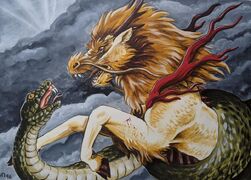
Celestial Pattern
The Celestial Order is the belief held by all Rokugani that all souls had their place in a celestial pattern as decreed by the Celestial Heavens.[1] It was essentially the Rokugani caste system. [2]
Dharma and Kharma[]
A person's place in the Celestial Order was determined by their "soul duty", or Dharma. How well they performed this duty during their life would be measured by their Kharma, and if it was performed well enough it could lead to a higher rank in the Celestial Order the next time they were reborn into the world. [3]
Rokugan's Social Order[]
The social order of Rokugan was divided mainly into three castes, [1] as it was determined by Lady Doji: [4]
- The Samurai, or those who fought.
- The Clergy, or those who prayed.
- The Bonge, or those who worked.
There was also a fourth, non-group; [1]
- Hinin, or non-people
Further Groups[]
The main castes of the Celestial Order could each be further divided into their own separate hierarchies. For example, the Samurai caste held the Emperor of Rokugan as its highest member, followed by the Kuge, the Buke, then the Ronin and finally the Ashigaru. [5]
Defying the Order[]
Those who dared to defy the Celestial Order shamed and befouled their existence. Not only was such a soul considered to be without honor, but they risked being reincarnated into an even lower station in their next life. [1]
Shinsei's View[]
The Celestial Order was developed by the Kami as a mirror of Tengoku's laws. Shinsei recognized something that the Kami chose not to, the Celestial Order was still merely a model and did not bind individuals the same way the cosmic laws of Tengoku bound Fortunes and Kami. Given training and ability, any person could improve himself to the point of achieving enlightenment. [6]
External Links[]
- Celestial Pattern (Anvil of Despair)
References
 |
This magic or religion related article is a stub. That means that it has been started, but is incomplete. You can help by expanding this article. |